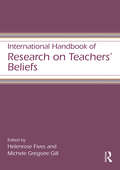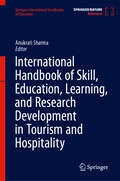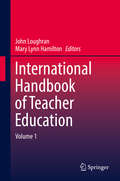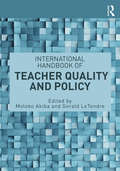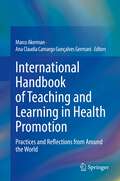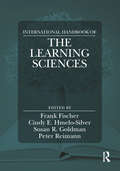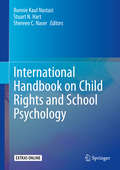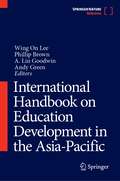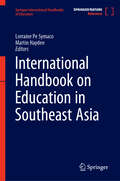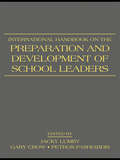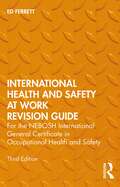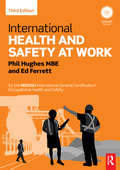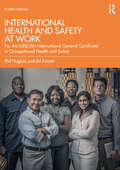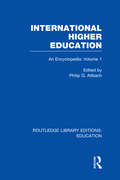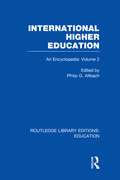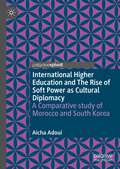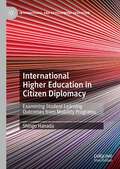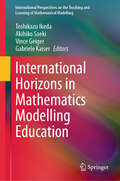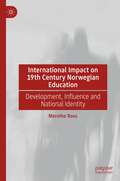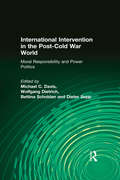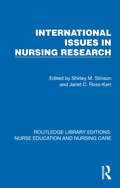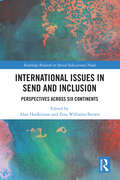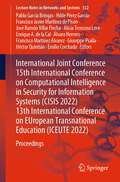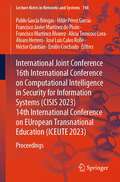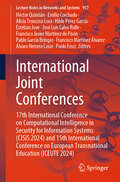- Table View
- List View
International Handbook of Research on Teachers' Beliefs (Educational Psychology Handbook)
by Helenrose Fives Michele Gregoire GillTeacher beliefs play a fundamental role in the education landscape. Nevertheless, most educational researchers only allude to teacher beliefs as part of a study on other subjects. This book fills a necessary gap by identifying the importance of research on teacher beliefs and providing a comprehensive overview of the topic. It provides novices and experts alike a single volume with which to understand a complex research landscape. Including a review of the historical foundations of the field, this book identifies current research trends, and summarizes the current knowledge base regarding teachers’ specific beliefs about content, instruction, students, and learning. For its innumerable applications within the field, this handbook is a necessity for anyone interested in educational research.
International Handbook of Skill, Education, Learning, and Research Development in Tourism and Hospitality (Springer International Handbooks of Education)
by Anukrati SharmaThis handbook provides new dimensions and directions to design tourism education curriculums and transform students' learning. It delves into issues such as job opportunities, business opportunities, required skill sets, and the role of critical and creative thinking in tourism education, and focuses on a shift in mindset from R&D (research and development) to L&D (learning and development), to aid in gaining in-the-field knowledge. It presents a global perspective on the latest trends, innovative curriculum, research, and skill needs in the travel, tourism, and hotel industry via empirical, theoretical, and conceptual chapters, as well as through global case studies. This handbook explores how to develop the skills, attributes and prospects for employment in these competitive industries, and also highlights what employers in the tourism and hospitality sectors expect from graduate and/or post-graduate candidates. Besides examining the contribution of tourism education towards a better society, this handbook introduces a new way of designing curriculums, and examines the past practices, current trends, and future opportunities in the field.
International Handbook of Teacher Education, Volume 1
by Mary Lynn Hamilton John LoughranThe International Handbooks of Teacher Education cover major issues in the field through chapters that offer detailed literature reviews designed to help readers to understand the history, issues and research developments across those topics most relevant to the field of teacher education from an international perspective. This volume is divided into two sections: The organisation and structure of teacher education; and, knowledge and practice of teacher education. The first section explores the complexities of teacher education, including the critical components of preparing teachers for teaching, and various aspects of teaching and teacher education that create tensions and strains. The second examines the knowledge and practice of teacher education, including the critical components of teachers’ professional knowledge, the pedagogy of teacher education, and their interrelationships, and delves into what we know and why it matters in teacher education.
International Handbook of Teacher Quality and Policy
by Gerald K. LeTendre Motoko AkibaThe International Handbook of Teacher Quality and Policy is a comprehensive resource that examines how teacher quality is conceptualized, negotiated, and contested, and teacher policies are developed and implemented by global, national, and local policy actors. Edited by two of the leading comparative authorities in the field, it draws on the research and contributions of scholars from across the globe to explore five central questions: How has teacher quality been conceptualized from various disciplinary and theoretical perspectives? How are global and transnational policy actors and networks influencing teacher policies and practices? What are the perspectives and experiences of teachers in local policy contexts? What do comparative research studies tell us about teachers and how their work and policy contexts influence their teaching? How have various countries implemented policies aimed at improving teacher quality and how have these policies influenced teachers and students? The international contributors represent a wide variety of scholars who identify global dynamics influencing policy discourses on teacher quality, and examine national and local teaching and policy environments influencing teacher policy development and implementation in various countries. Divided into five sections, the book brings together the latest conceptual and empirical studies on teacher quality and teacher policies to inform future policy directions for recruiting, educating, and supporting the teaching profession.
International Handbook of Teaching and Learning in Health Promotion: Practices and Reflections from Around the World
by Marco Akerman Ana Claudia Camargo Gonçalves GermaniThis international handbook brings together researchers and teachers from 25 countries of the five continents to share their experiences of teaching health promotion in undergraduate and graduate courses related to different health professions. Chapter authors share teaching methodologies used in classes, discuss the competencies students need to learn and indicate research opportunities. Readers will be provided with real-world examples of empowering, participatory, holistic, intersectoral, equitable and sustainable teaching/learning strategies that aim to improve health and reduce health inequities. This handbook was edited by an editorial board formed by 12 members of the International Union for Health Promotion and Education (IUHPE) from seven countries – Brazil, Belgium, Canada, Israel, New Zealand, Taiwan and UK –, and includes 45 chapters organized in seven thematic sections, each one dedicated to a different aspect of the process of teaching and learning health promotion: The health promotion curriculum Making health promotion relevant to practice Pedagogies for health promotion Special topics for health promotion Health promotion assessment and quality assurance Health promotion as a transformational practice Students’ reflections The International Handbook of Teaching and Learning in Health Promotion: Practices and Reflections from Around the World aims to encourage a dialogue between teaching and learning practices carried out locally and the possibilities of replicating these experiences globally, recognizing cultural differences and similarities. This handbook is intended for a wide range of readers, including education and training providers, health professionals and health care students. Due to its intersectoral and interdisciplinary approach, it will also be of interest to teachers and students in other fields of the Social Sciences, such as Urban Planning, Social Work, Public Policy, International Relations and Population Studies.
International Handbook of the Learning Sciences
by Peter Reimann Frank Fischer Cindy E. Hmelo-Silver Susan R. GoldmanThe International Handbook of the Learning Sciences is a comprehensive collection of international perspectives on this interdisciplinary field. In more than 50 chapters, leading experts synthesize past, current, and emerging theoretical and empirical directions for learning sciences research. The three sections of the handbook capture, respectively: foundational contributions from multiple disciplines and the ways in which the learning sciences has fashioned these into its own brand of use-oriented theory, design, and evidence; learning sciences approaches to designing, researching, and evaluating learning broadly construed; and the methodological diversity of learning sciences research, assessment, and analytic approaches. This pioneering collection is the definitive volume of international learning sciences scholarship and an essential text for scholars in this area.
International Handbook on Child Rights and School Psychology
by Bonnie Kaul Nastasi Stuart N. Hart Shereen C. NaserThis handbook examines the meanings, implications, and transformative potential of a child-rights approach for school psychology. It focuses on the school community, in which psychology is committed to promoting well-being, learning, and development of all children. The handbook begins with an overview of the 1989 United Nations Committee on the Rights of the Child (CRC) and explores main themes such as, survival, protection, development, participation, and nondiscrimination. Chapters provide guidance in promoting and protecting child rights when dealing with critical issues relevant to the school community, including well-being, freedom from violence, and access to high quality education. In addition, chapters analyze and offer recommendations for child rights applications within the roles and responsibilities of school psychologists. The handbook concludes with future directions for achieving a child-rights approach for school psychology. Topics featured in this handbook include:The current status of child rights in the international community.Accountability for child rights by school psychology.Collaborative home, school, and community practices aimed at promoting family support.Protecting child rights within the realm of competitive sports.CRC and school-based intervention programming.Promoting child rights through school leadership.Applying child rights-respecting research to the study of psychological well-being. The International Handbook on Child Rights and School Psychology is a must-have resource for researchers, scientist-practitioners, clinicians, and graduate students in child and school psychology, educational policy and politics, social work, public health, and other school-based or child-serving mental health disciplines.
International Handbook on Education Development in the Asia-Pacific
by A. Lin Goodwin Wing On Lee Andy Green Phillip BrownThe Springer International Handbook of Educational Development in Asia Pacific breaks new ground with a comprehensive, fine-grained and diverse perspective on research and education development throughout the Asia Pacific region. In 13 sections and 127 chapters, the Handbook delves into a wide spectrum of contemporary topics including educational equity and quality, language education, learning and human development, workplace learning, teacher education and professionalization, higher education organisations, citizenship and moral education, and high performing education systems. The Handbook is grounded in specific Asia Pacific contexts and scholarly traditions, using unique country-specific narratives, for example, Vietnam and Melanesia, and socio-cultural investigations through lenses such as language identity or colonisation, while offering parallel academic discourse and analyses framed by broader policy commentary from around the world.
International Handbook on Education in Southeast Asia (Springer International Handbooks of Education)
by Martin Hayden Lorraine Pe SymacoThis International Handbook provides a detailed account of the education systems of 11 Southeast Asian nations, including Brunei Darussalam, Cambodia, Indonesia, Lao People’s Democratic Republic, Malaysia, Myanmar, the Philippines, Singapore, Thailand, Timor- Leste, and Vietnam. It presents a systematic sector-by-sector explanation of how these national education systems deliver educational services and respond to national and international issues and challenges. With 56 chapters, the International Handbook is the region’s most comprehensive educational reference source. In the first of its chapters, the editors introduce the regional context and draw attention to the distinctive characteristics of each of the 11 systems. Southeast Asia, representing 8.5% of the world’s population, is as dynamic as it is diverse. The International Handbook charts progress and establishes a benchmark for documenting future developments. It also provides a stepping-off point for more detailed investigations of decision-making processes and outcomes across the 11 national education systems.
International Handbook on the Preparation and Development of School Leaders
by Petros Pashiardis Jacky Lumby Gary CrowSponsored by the University Council of Educational Administration (UCEA), the British Educational Leadership, Management, and Administration Society (BELMAS), and the Commonwealth Council for Educational Administration and Management (CCEAM), this is the first book to provide a comprehensive and comparative review of what is known about the preparation and development of primary and secondary school leaders across the globe. It describes current issues and debates and offers an assessment of where the field of leadership development is headed. Key features include the following: Global Focus: this book provides the first comprehensive look at leadership preparation and development across the globe. The chapter authors are distinguished scholars, drawn from the US, UK, Europe, Asia, Canada, Australia/New Zealand, and Africa. Topical & Geographical Focus: provides researchers and policymakers with critical descriptions and assessments of both topical and geographical areas. International Expertise: chapter contributors are drawn from a variety of theoretical perspectives and represent all major continents.
International Health and Safety at Work Revision Guide: for the NEBOSH International General Certificate in Occupational Health and Safety
by Ed FerrettThis companion to the renowned International Health and Safety at Work textbook by Hughes and Ferrett is an essential revision aid for students preparing for their written assessments on the NEBOSH International General Certificate in Occupational Health and Safety. Fully updated to the 2019 specification, the revision guide provides complete coverage of the syllabus in bite-sized chunks, helping readers to learn and memorise the most important topics. Throughout the book, the guide links back to the International Health and Safety at Work textbook, helping students to consolidate their learning. Small and portable making it ideal for use anywhere – at home, in the classroom or on the move – the revision guide suggests useful tips on study and examination technique. It includes practice questions and answers based on NEBOSH exam questions, providing everything you need for productive revision in one handy reference. Now in its third edition, the International Health and Safety Revision Guide, written by the renowned health and safety author and former NEBOSH Vice Chairman Ed Ferrett, is an invaluable tool for students as they prepare for their NEBOSH exam and for their subsequent health and safety work.
International Health and Safety at Work: for the NEBOSH International General Certificate in Occupational Health and Safety
by Phil Hughes Ed FerrettInternational Health and Safety at Work has been specially written in simple English for the thousands of students who complete the NEBOSH International General Certificate in Health and Safety each year. Fully revised in alignment with the April 2015 syllabus, this third edition provides students with all they need to tackle the course with confidence. Clear, easily accessible information is presented in full colour, with discussion of essential principles such as ILO and OSH conventions as well as legal frameworks from a range of countries. Aligned to the NEBOSH International General Certificate in Occupational Health and Safety Practice questions and answers to test knowledge and increase understanding Complete with a companion website containing extra resources for tutors and students at www.routledge.com/cw/hughes The only textbook endorsed for the NEBOSH International General Certificate in Health and Safety, International Health and Safety at Work remains the most effective tool for those working to fit international health and safety standards to local needs and practice.
International Health and Safety at Work: for the NEBOSH International General Certificate in Occupational Health and Safety
by Ed Ferrett Phil Hughes MBEInternational Health and Safety at Work has been specially written in simple English for the thousands of students who complete the NEBOSH International General Certificate in Health and Safety each year. Fully revised in alignment with the 2019 syllabus, this fourth edition provides students with all they need to tackle the course with confidence. Clear, easily accessible information is presented in full colour, with discussion of essential principles such as ILO and OSH conventions as well as legal frameworks from a range of countries. The book features practice questions and answers to test knowledge and increase understanding. International Health and Safety at Work remains the most effective tool for those working to fit international health and safety standards to local needs and practice.
International Higher Education Volume 1: An Encyclopedia (Routledge Library Editions: Education)
by Philip G. AltbachThis encyclopedia is the result of a highly selective enterprise that provides a careful selection of key topics in essays written by top scholars in their fields. Comprehensive and in-depth coverage of a limited number of countries, regions and themes is provided. The essays not only feature statistical and factual information but significant interpretation of those facts and figures. The chapters on themes and topics are both analytic and interpretative and deal with the most important topics relevant to higher education everywhere. More than a compendium of facts and figures the encyclopedia is a comprehensive overview of a growing field of research and analysis.
International Higher Education Volume 2: An Encyclopedia (Routledge Library Editions: Education)
by Philip G. AltbachThis encyclopedia is the result of a highly selective enterprise that provides a careful selection of key topics in essays written by top scholars in their fields. Comprehensive and in-depth coverage of a limited number of countries, regions and themes is provided. The essays not only feature statistical and factual information but significant interpretation of those facts and figures. The chapters on themes and topics are both analytic and interpretative and deal with the most important topics relevant to higher education everywhere. More than a compendium of facts and figures the encyclopedia is a comprehensive overview of a growing field of research and analysis.
International Higher Education and The Rise of Soft Power as Cultural Diplomacy: A Comparative study of Morocco and South Korea
by Aicha AdouiThis book offers a comprehensive analysis of international higher education and soft power as cultural diplomacy, through a study of Morocco and South Korea. It draws on extensive original research to explore the social, political, and economic factors that have shaped the international standing of both countries in terms of higher education. The research reveals the importance of higher education in promoting soft power and the role of international universities in enhancing the international reputation of a country. The book's key findings demonstrate the impact of soft power as cultural diplomacy on international relations and the contribution it makes to research in the field of international higher education.
International Higher Education in Citizen Diplomacy: Examining Student Learning Outcomes from Mobility Programs (International and Development Education)
by Shingo HanadaThis volume presents the impacts of international higher education on citizen diplomacy. Based on the assumption that international higher education is a key driving factor of citizen diplomacy, the empirical studies in this book examine the learning outcomes of five mobility programs of international higher education(inbound study abroad, outbound study abroad, international service-learning, international internship, and online study abroad) in cultivating students’ intercultural competence, empathy and goodwill towards people in the host country. It contributes to increasing awareness of international higher education by providing insights about its functions in citizen diplomacy.
International Horizons in Mathematics Modelling Education (International Perspectives on the Teaching and Learning of Mathematical Modelling)
by Gabriele Kaiser Vince Geiger Toshikazu Ikeda Akihiko SaekiThis edited volume provides an extensive overview of the recent strides in global modelling education. It examines the interplay between modelling education and various dimensions of the educational landscape. Firstly, it delves deeply into the intersection of modelling education with interdisciplinary STEM education, teacher education, lesson study, engineering, problem-solving and posing, and creativity. Moreover, the book places a strong emphasis on the integration of modelling education with foundational mathematical concepts including algebra, geometry, functions, and statistics, demonstrating their integral role across elementary, secondary, and tertiary levels of mathematics education. Furthermore, the book delves into the specific issues and considerations that shape modelling education. It addresses critical pedagogical aspects, the integration of technology, and cultural and contextual considerations. In essence, this book stands as a comprehensive guide that not only surveys the recent advances in global modelling education but also offers invaluable insights and practical guidance.
International Impact on 19th Century Norwegian Education: Development, Influence and National Identity
by Merethe RoosThis book examines Norwegian education throughout the course of the 19th century, and discusses its development in light of broader transnational impulses. The nineteenth century is regarded as a period of increasing national consciousness in Norway, pointing forward to the political independency that the country was granted in 1905. Education played an important role in this process of nationalisation: the author posits that transnational – for the most part Scandinavian – impulses were more decisive for the development of Norwegian education than has been acknowledged in previous research. Drawing on the work of educator and school bureaucrat Hartvig Nissen, who is recognised as the most important educational strategist in 19th century Norway, this book will be of interest to scholars of the history of education and Norwegian education more generally.
International Intervention in the Post-Cold War World: Moral Responsibility and Power Politics
by Wolfgang Dietrich Michael C. Davis Bettina ScholdanInternational intervention on humanitarian grounds has been a contentious issue for decades. First, it pits the principle of state sovereignty against claims of universal human rights. Second, the motivations of intervening states may be open to question when avowals of moral action are arguably the fig leaf covering an assertion of power for political advantage. These questions have been salient in the context of the Balkan and African wars and U.S. policy in the Middle East. This volume undertakes a serious, systematic, and broadly international review of the issues.
International Issues in Nursing Research (Routledge Library Editions: Nurse Education and Nursing Care)
by Shirley M. Stinson Ross-Kerr, Janet C.Originally published in 1986 this book presents a review of specific international themes in nursing research, particularly methodological issues; policy and funding issues; preparation for nursing research and other perspectives such as publication and the role of professional associations in nursing research development. In the past, geographical political, cultural, educational and economic barriers all contributed to insularity in nursing, but the authors maintain that there are many common problems and the profession can benefit greatly by an exchange of ideas. The chapters were written by leading authorities in the UK, USA and Canada and the book will be of use to student and practising nurses.
International Issues in SEND and Inclusion: Perspectives Across Six Continents (Routledge Research in Special Educational Needs)
by Alan Hodkinson Zeta Williams-BrownInternational Issues in SEND and Inclusion brings together a collection of cutting-edge researches on approaches to special education needs and disability education, across 6 continents and within 12 countries. Written by authors who are experts in their own countries in relation to special educational needs and disability, the book provides a unique knowledge and understanding of different international perspectives in special educational needs, disability and inclusion. The chapters present extended case studies and reflect on current policy, practice and theory within that context, challenging assumptions which can dominate the policy and practice of inclusive education. Each of the six continents has a separate section and introduction within the book to offer a relevant approach and context for analysis. The book will be of great interest to academics, researchers and postgraduate students in the fields of inclusion, special educational needs and disability, teacher education and comparative education.
International Joint Conference 15th International Conference on Computational Intelligence in Security for Information Systems: Proceedings (Lecture Notes in Networks and Systems #532)
by Álvaro Herrero Héctor Quintián Emilio Corchado Francisco Javier Martínez de Pisón Hilde Pérez García Enrique A. de la Cal Francisco Martínez Álvarez Alicia Troncoso Lora Pablo García Bringas José Ramón Villar Flecha Giuseppe PsailaThis book of Lecture Notes in Networks and Systems contains accepted papers presented at the 15th International Conference on Computational Intelligence in Security for Information Systems (CISIS 2022) and the 13th International Conference on EUropean Transnational Education (ICEUTE 2022). These conferences were held in the beautiful city of Salamanca, Spain, in September 2022. The aim of the CISIS 2022 conference is to offer a meeting opportunity for academic and industry-related researchers belonging to the various, vast communities of computational intelligence, information security, and data mining. The need for intelligent, flexible behaviour by large, complex systems, especially in mission-critical domains, is intended to be the catalyst and the aggregation stimulus for the overall event. After a thorough peer review process, the CISIS 2022 International Program Committee selected 20 papers, which are published in this conference proceedings. In this edition, three special sessions were organized: Cybersecurity in Future Connected Societies, Cybersecurity and Trusted Supply Chains of ICT, and Intelligent Solutions for Cybersecurity Systems. The aim of ICEUTE 2022 is to offer a meeting point for people working on transnational education within Europe. It provides a stimulating and fruitful forum for presenting and discussing the latest works and advances on transnational education within European countries. In the case of ICEUTE 2022, the International Program Committee selected 5 papers, which are also published in this conference proceedings. The selection of papers was extremely rigorous to maintain the high quality of the conferences. We want to thank the members of the Program Committees for their hard work during the reviewing process. This is a crucial process for creating a high-standard conference; the CISIS and ICEUTE would not exist without their help.
International Joint Conference 16th International Conference on Computational Intelligence in Security for Information Systems: Proceedings (Lecture Notes in Networks and Systems #748)
by Álvaro Herrero Héctor Quintián Emilio Corchado Francisco Javier Martínez de Pisón Hilde Pérez García Francisco Martínez Álvarez Alicia Troncoso Lora Pablo García Bringas José Luis Calvo RolleThis book of Lecture Notes in Networks and Systems contains accepted papers presented at the 16th International Conference on Computational Intelligence in Security for Information Systems (CISIS 2023) and the 14th International Conference on EUropean Transnational Education (ICEUTE 2023). These conferences were held in the beautiful city of Salamanca, Spain, in September 2023.The aim of the CISIS 2023 conference is to offer a meeting opportunity for academic and industry-related researchers belonging to the various, vast communities of computational intelligence, information security, and data mining. The need for intelligent, flexible behavior by large, complex systems, especially in mission-critical domains, is intended to be the catalyst and the aggregation stimulus for the overall event. The aim of ICEUTE 2023 conference is to offer a meeting point for people working on transnational education within Europe. It provides a stimulating and fruitful forum for presenting and discussing the latest works and advances on transnational education within European countries.
International Joint Conferences: 17th International Conference on Computational Intelligence in Security for Information Systems (CISIS 2024) and 15th International Conference on European Transnational Education (ICEUTE 2024) (Lecture Notes in Networks and Systems #957)
by Héctor Quintián Emilio Corchado Francisco Javier Martínez de Pisón Hilde Pérez García Francisco Martínez Álvarez Alicia Troncoso Lora Pablo García Bringas Esteban Jove José Luis Calvo Rolle Paolo Fosci Álvaro Herrero CosíoThis volume of Lecture Notes in Networks and Systems contains accepted papers presented at the 17th International Conference on Computational Intelligence in Security for Information Systems (CISIS 2024) and the 15th International Conference on EUropean Transnational Education (ICEUTE 2024), which were held in the beautiful city of Salamanca, Spain, in October 2024. The aim of the CISIS 2024 conference is to offer a meeting opportunity for academic and industry-related researchers belonging to the various vast communities of Computational Intelligence, Information Security, and Data Mining. The need for intelligent, flexible behavior by large, complex systems, especially in mission-critical domains, is intended to be the catalyst and the aggregation stimulus for the overall event. After peer review, the CISIS 2024 International Program Committee selected 24 papers for publication in these conference proceedings. In this edition, one special session was organized: Artificial Intelligence for Protecting the Internet of Things. The aim of ICEUTE 2024 conference is to offer a stimulating and fruitful meeting point for people working on transnational education within Europe. It provides an exciting forum for presenting and discussing the latest works and advances in transnational education within European countries. In the case of ICEUTE 2024, the International Program Committee selected nine papers, which are also published in these conference proceedings. The selection of papers was extremely rigorous to maintain the high quality of the conferences. We deeply appreciate the hard work and dedication of the members of the Program Committees during the reviewing process. Their contributions are integral to the creation of a high-standard conference; the CISIS and ICEUTE conferences would not exist without their help.
